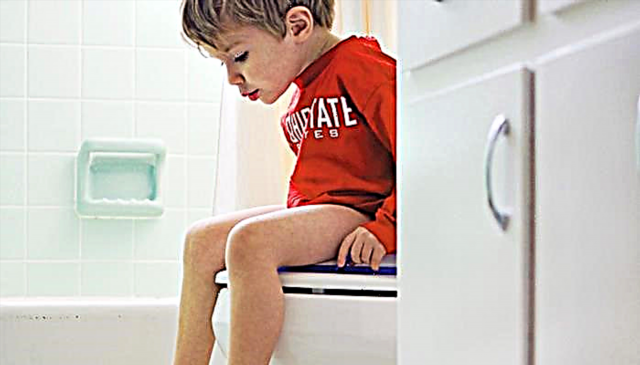For many parents, putting a child to bed is a much more serious problem than waking him up. However, not everything is so simple with forced awakening. If it is wrong to wake up the baby, it can not only ruin the child's mood, but also his fragile psyche and nervous system will be under attack. To avoid this, it is worth listening to the recommendations of psychologists.

Ideally, the child should fall asleep and wake up on his own, and it is better not to wake the child up at all. The child's body itself knows how many hours it needs to sleep. But in real life, situations are not excluded when you have to obey the circumstances and change the daily routine. The reasons for the forced awakening can be as follows:
- The transition to one daytime sleep, when the baby has reached kindergarten age and is preparing for preschool;
- The need to take the child to the toilet at night (potty training);
- In connection with the regimen of taking medications or medical procedures;
- The kid fell asleep in the transport, but it's time to get out;
- The child fell asleep before the arrival of the doctor ... and so on
If you wake up the child abruptly, it can scare him, he will start crying, in some babies in this case, tremors may begin. All these are symptoms that the blow fell on the child's fragile central nervous system and the consequences can be the most unpleasant: restless sleep, stuttering, neuroses, speech impairment.
Sleep compliance is important
The correct sleep pattern for a small child affects all spheres of his life: psycho-emotional state, activity, mood, vigor. With a lack of sleep, the baby will be lethargic, quickly tired, irritable. The child will have poor grades. And waking up in the morning will be a real problem.
Several Reasons for Difficulty Waking Up
Your child lived serenely, lay down when his eyes stick together, got up when he wanted. But it was time to go to kindergarten and everything changed. For some reason, such a loyal mother always tries to go to bed at 9 o'clock and wakes her up when it's still dark outside. What happened? The kid resists, mom swears. A real nightmare!
To prevent this from happening, the child needs to be taught to the daily routine in advance, or better from the first days of life. At first, he will wake up only to feed and change clothes, then the breaks between sleep will increase until it comes to naps once a day. All hours of sleep and wakefulness are recommended to be done at the set time, and not when the child falls asleep on the go.
Take an interest in the daily routine in kindergarten and bring your child's sleep and wake times closer to it. Thus, addiction will be the least painful when entering preschool.
One of the important factors is the length of daytime sleep. The younger the child is, the longer he should sleep during the day. From about 1 - 1.5 years old, children begin to go to bed once in the daytime. A child who, for whatever reason, has missed a daytime sleep, must make up for it at night. If this is the case, try to put your baby to bed early in the evening. Most likely, this will not be too problematic, since the child will get tired during such a long wakefulness. When putting your baby to bed earlier than usual, turn off the TV, dim the lights, read a book, or tell a story. Once in a warm, cozy bed and hearing the native lulling sounds of mom's voice, the baby is unlikely to be able to cope with a nap and fall asleep.
Some babies, due to the physiological characteristics of the body at the age of three, generally refuse to sleep during the day. In this case, it is important to ensure good restful sleep at night. The kid should go to bed on time, especially if the next day is to go to kindergarten.
The duration of a child's daily sleep, like that of an adult, also depends on the season. In winter, the baby should sleep more; in summer, when daylight hours increase, the body needs to rest about an hour less than usual.

The general daily routine in the family plays an important role for a calm falling asleep. If you put the child to bed and dad is watching a funny show in the other room and laughing, there will be little sense. Agree with all family members living with you that there will be silence from 9 pm. It is not necessary for everyone to go to bed at this time, you just need to move on to calm, quiet activities. Dim the lights in adjoining rooms, turn down the TV, and stop loud conversations and laughter. Tell the baby that mom and dad also go to bed, then he will not be interested in further wakefulness.
For good sleep in the evening, try to put your child to bed early during the day. We walked, had lunch and went to bed. Daytime sleep should be at the same time every day. The child's body will gradually get used to it, and falling asleep will be easy.
The deliberate formation of conditioned reflexes is possible only with strict daily adherence to the daily regimen. The psycho-emotional state of the child, his activity, the ability to assimilate new knowledge and acquire the necessary skills directly depends on the correct distribution of sleep and wake time.
To ensure comfortable sleep and good sleep throughout the night, certain conditions must be created.
- Dress your toddler in loose, soft, soft fabrics. Make sure there are no tight cuffs, ties, tight seams on it. If the child often opens up, then the pajamas should be warm.
- When choosing bed linen, pay attention to the fact that the material is soft. After washing, you do not need to starch it so as not to harm the baby's skin.
- Ventilate the room daily before bed. The optimum temperature for sleeping is 18 ° C.
- When buying a bed, make sure it is comfortable and spacious. Pay special attention to the choice of a mattress, find out what it is filled with and check the quality of the fabric.
- Do not put your child to bed if he is hungry. It is desirable that a little time pass after eating. Going to bed on a full stomach is also not recommended.
- To prevent fear of the dark, turn on a dim night light.
[sc name = ”rsa”]
Subject to the above conditions, the baby will be cozy and comfortable, the sleep will be long and calm, which means the child will be able to rest well and gain strength before a new day.
A few tips for falling asleep quickly
Preparing for bed in advance is an important procedure, thanks to which you can correctly adjust your baby's biological clock. Lying down at the same time, the child's body will get used to a certain rhythm and will independently signal when he needs rest.
Laying down can be a calm and enjoyable ending to your day if you follow these guidelines consistently.
- Create your own unique falling asleep ritual. Affectionate strokes, "hugs", light massage and gentle words will soothe the child and tune in to the sleep phase.
- Lay your baby at the same time every day.
- Create a dream-like environment in your apartment: draw up the curtains, turn off the computer and TV, and dim the bright lights. Low lighting can be left in the baby's room, and it is better if you teach your child to sleep in the dark. So the sleep will be much longer and calmer. The presence of bright lighting makes children restless and nervous.
- About an hour before bed, make sure the child switches to quiet play. If he is overexcited before bed, falling asleep can be difficult and sleep restless.
- Make sure that the kid spends the day actively: walking in the fresh air, playing outdoor games. Having run around and tired, children fall asleep much easier, since the body needs rest.
- Come up with a ritual for pre-bedtime activities: bathing in the evening, reading a book or telling a fairy tale, a lullaby before bed, watching a good, kind cartoon.
- Laying ceremony should be short.
- When choosing fairy tales, give preference to stories with a good ending, without violence or violent scenes.
- If the child is overexcited, a warm herbal bath will help calm down and tune in to sleep.
- Encourage your baby to fall asleep with a soft toy. Being in a room without a mom, the child will not feel lonely.
- A few minutes spent with mom in her arms will calm the baby and make it easier to fall asleep.

How to wake up a child: useful tips
- Analyze the baby's sleep: how many hours he sleeps, at what time he wakes up. If he wakes up at night - how long after falling asleep does it happen. Human sleep has several phases combined into a cycle. The easiest way to wake up is between cycles, usually 90-100 minutes. That is, the child can wake up faster and easier after one and a half, three, four and a half, six, seven and a half, nine hours of sleep.
- If you do not know exactly how many hours your baby sleeps, try to time the awakening in REM sleep. Pay attention to the signs of the child's behavior during sleep: makes sounds, blinks, rolls his eyes, the baby has rapid breathing, the baby moves in bed - all this means that the baby is in a state of REM sleep. At such a moment, it is very easy to wake him up, a gentle touch or a quiet call to wake up is enough.
- Gently massage your ears, feet, palms, stroke, kiss - all these are much more effective techniques for waking up in a good mood.
- Turn on a dim night light or quiet pleasant music.
- If the child has to go to kindergarten or school, you should start waking him up as early as possible, so that there is some time left to lie down in bed.
- If you do a little exercise while lying in bed, or a light massage, stretching - the child's muscles come to tone, the blood accelerates, and the child's body quickly goes into a state of wakefulness.
- Establish pleasant morning rituals to help combat moods and bad moods. Turn waking up into a game: who will run to the bathroom faster, rush to wake up your favorite doll, look out the window to see what is interesting there today, drink delicious cocoa. In other words, find any excuse to cheer up and charge your baby with positive energy.
How not to wake up a child?
A sudden awakening can scare the child and cause him psychological trauma (not to mention the fact that crying and whims after that are provided to you), therefore, it is unacceptable:
- wake up the child with a sharp commanding voice or shout;
- turn on loud music or an alarm;
- turn on a bright light;
- pull off the blanket sharply;
- wake up in a hurry and rush the child.
All of these techniques and warnings are simple, but they must be followed with a grain of salt. Thus, the child will develop an internal regime, and waking up at the right time will no longer be a problem.
Why doesn't the child want to wake up?
In addition to knowing the methodology for the correct awakening of the baby, you should know the reasons for the reluctance to get up on time. If eliminated, the process of waking up will be easy and desirable.
While the baby constantly spends time at home, the daily routine is adjusted to his desires: voluntary falling asleep and waking up. But when you have to change the regime to kindergarten or school, difficulties begin. To deal with them, you need to prepare. Parents need to familiarize themselves with the daily routine of the preschool institution, find out what time the kids eat, play, what time it is quiet. By gradually adjusting to the new routine, the child will have no problem sleeping and waking up.
An important condition for the full development and good health of the baby is sleep, he must be healthy, strong and calm. Only a well-slept baby can be easily woken up and not harm his health and mood.
- How to wake up a child in the morning in kindergarten: advice from a psychologist
- How to wake up a child in kindergarten



